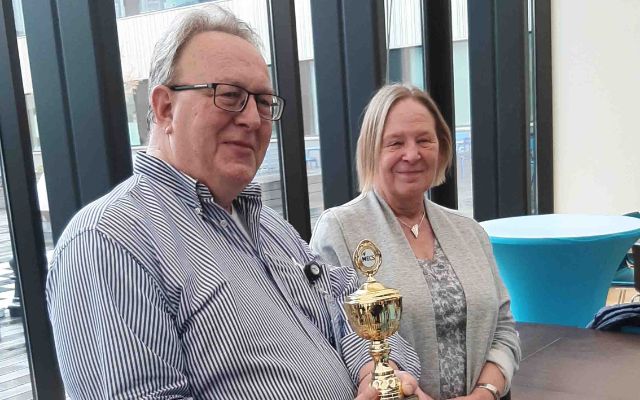|
|
| Goodbye to Wim Haije |
On March 31, we had an informal gathering to say farewell to Wim Haije, a colourful and dedicated member of our e-Refinery institute. Together with Bernard Dam and John Nijenhuis, he stood at the cradle of the e-Refinery. In the past years, he was very important in bringing colleagues together especially on the indirect route, asking colleagues critical questions, and also appeared multiple times in popular media to tell the public about our approach and goals. We wish Wim and his partner Gaby all the best for the future: we hope they will greatly enjoy their retirement!
On behalf of the e-Refinery community, Ruud van Ommen |
|
|
|
|
|
|
|
|
|
We asked Wim to look back on his time at e-Refinery:
A time of pioneering
"The history of me and e-Refinery would not be complete if I just started at the moment that something like the vague shapes of the later e-Refinery emerged. It must be said that first of all, within 3mE Process & Energy, the notion of non-continuous sustainable energy sources and the necessary enabling energy storage options took form. I was asked by Bendiks Jan Boersma, who knew I was available, to help Wiebren de Jong in defining the scope of the chair Large-Scale Energy Storage that he was going to lead. That was a nice challenge that very well fitted with my background at the Energy Research Centre of the Netherlands.
It became very soon more than clear that at different faculties different aspects of the necessary technological and scientific background were present and firstly together with John Nijenhuis my office mate and later also with Bernard Dam, leading a section where electrochemistry and catalysis were prominently being developed, the first seeds of e-Refinery were planted within AS and 3mE. White spots in the needed disciplines were recognized and in that way PI’s from Bio Engineering (AS) and Materials Science (3mE), TPM and EEMCS joined and later also AE. This was soon called the e-Refinery Initiative lead by Paulien Herder, later to become the e-Refinery Institute.
Activities emerged all over the place: PI’s used their grants, subsidies etc. to fund the research, large subsidies were obtained from government and the EU. Suddenly being part of an entity supported by so many people with different backgrounds, who see the urgency of the research to be done to counteract climate change, was and still is a great experience."
All for one, one for all!
"This is exactly what makes e-Refinery so strong; all disciplines needed to bring it to a success are gathered together from five faculties. Young and old together coming up with new initiatives and cooperations, their own networks, their own expertise: all for one, one for all!

My view of the future has a dark and bright side. Dark, to quote myself from an interview in the Financieel Dagblad, because this sense of urgency started “too late, too late, too late”. At the same time, with all these good and enthusiastic scientists doing their utmost in making an extreme paradigm shift possible, changes for the worse may be prevented! E-Refinery has to lead the way, be self-critical as to what developments are promising and which ones are not. I hope it will be recognized as the leading Institute in this field on a national and international level.
I want to stay involved by keeping myself informed, attend meetings etc, and of course I will always be available for advice and discussion. I think my book is closed and the new generations take over as it should be!" |
|
|
|
|
|
|
|
|
| |
|
|
|